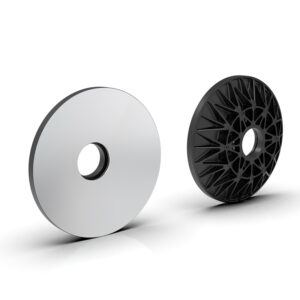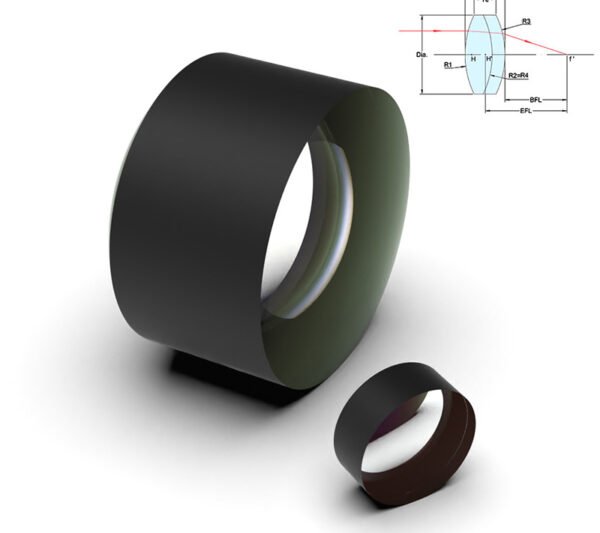Glass molded non spherical lens
- Surface finish: 40-20
- Surface type: λ/4
- Effective aperture: 90%
- Optical eccentricity: < 45 ″
- Product manual: Maipu Optoelectronics is committed to providing customized optical components for cylindrical mirror series for users. The main products include plastic non spherical lenses, molded non spherical lenses, and various other non spherical lenses. The product has high precision, welcome to consult.
- Category:Ultra smooth glass non spherical surface、metal reflector、glass molded lens、Levicorn spindle、ultra precision optical mold
describe
Glass molded non spherical lenses are glass lenses manufactured through high-temperature molding technology, with a non spherical surface shape to improve the imaging quality and performance of optical systems. This type of lens is widely used in high-end optical equipment, including cameras, telescopes, laser systems, and optical sensors. Compared with traditional spherical lenses, non spherical lenses can more effectively reduce optical aberrations, provide clearer views, and higher imaging accuracy.
General parameters
| Molded non spherical lenses can be processed with conventional indicators | |
| material | optical glass |
| Product Category | Molded non spherical lens |
| Processing diameter (mm) | 1-60 |
| Diameter tolerance (mm) | ±0.05 |
| Thickness tolerance (mm) | ±0.05 |
| Surface smoothness (American standard) | 60-40 or 40-20 |
| Surface Accuracy | λ/8 @ 632.8nm or higher |
| Focal length error | ±2% |
| Optical aperture | >90% |
| core shift | <3 ‘or higher |
| chamfer | 0.2mmX45° |
| coating film | Customize according to demand |
characteristic
Non spherical design: The surface of aluminum non spherical mirrors can have complex geometric shapes, which can more effectively focus light, reduce optical distortions (such as spherical aberration, coma, and chromatic aberration), and provide higher imaging quality. The design of non spherical surfaces can optimize optical performance more flexibly and adapt to various application requirements.
Lightweight and Strength: Aluminum is a lightweight and high-strength material commonly used in the manufacturing of optical mirrors, especially in large optical equipment, which can effectively reduce the overall weight and facilitate portability and installation.
Good reflectivity: Aluminum has high reflectivity, especially in the visible and near-infrared spectral ranges. After appropriate coating treatment, the aluminum surface can achieve higher light reflection efficiency and minimize light loss to the greatest extent possible.
application area
- Laser system: Aluminum non spherical mirrors are commonly used in lasers and laser systems to optimize the shape and focusing effect of laser beams.
- Imaging system: Used in microscopes, telescopes, and other imaging devices to improve image resolution and contrast.
- Optical sensors: In smart devices and high-tech sensors, aluminum non spherical mirrors help improve the efficiency and accuracy of light collection, and are widely used in various optical sensing and detection devices.
manufacture
- Manufacturing process: The production of aluminum non spherical reflectors involves precise optical design, CNC machining, grinding, and polishing to ensure that the geometric shape and smoothness of the reflective surface meet high standards. Usually, coating treatment is also required to enhance the reflective performance.
- Processing difficulty: The manufacturing of non spherical shapes is complex and costly, requiring specialized equipment and technology, so special attention must be paid in the design and production process.
Future Development
With the development of optical technology and the emergence of new materials, the design and application of aluminum non spherical mirrors will be enhanced in a wider range of fields, especially in micro nano optics and optoelectronics, providing a lot of innovative potential.
In short, aluminum non spherical reflectors have become an indispensable component in modern optical systems due to their superior optical performance and wide application potential, promoting the development and innovation of optical technology.

If you are interested in our optical components, you can contact us and our engineers will reply to you as soon as possible.







![62a1cd831b01b[1] 62a1cd831b01b[1]](https://asphericoptics.com/wp-content/uploads/2024/09/62a1cd831b01b1-800x701.jpg)

